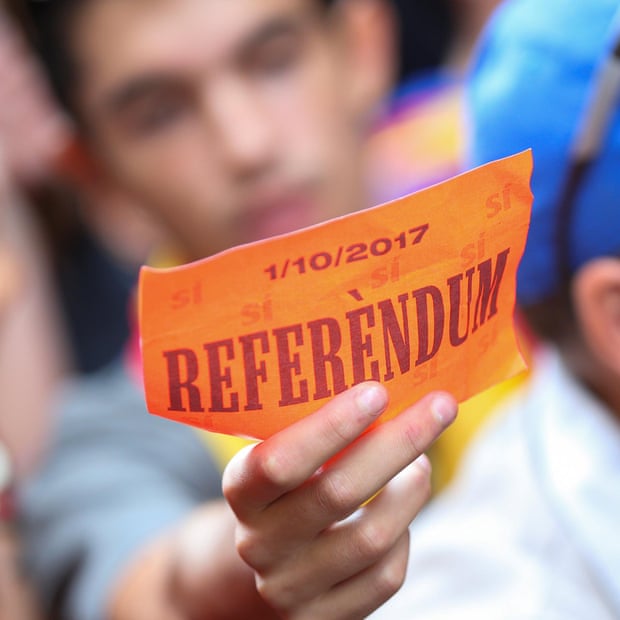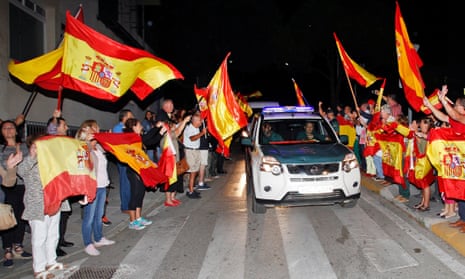Police will be deployed at polling stations to prevent people from voting in the Catalan independence referendum, the Spanish government has confirmed.
Although the Catalonia regional government has insisted the unilateral poll will go ahead on Sunday, the Spanish government has vowed to stop the vote, which it says is a clear violation of the constitution. Spain’s constitutional court has suspended the legislation underpinning the referendum while it rules on its legality.
A spokesman for the Spanish government’s Catalan delegation said on Tuesday that the region’s prosecutor had ordered the Mossos d’Esquadra, Catalonia’s police force, to take control of polling booths and identify those in charge.
“The order has been conveyed and it will be executed with all normality,” he said.
The Spanish government said the steps it had taken over the past week, including raiding Catalan government offices, arresting 14 officials and seizing almost 10m ballot papers, meant the vote could not take place.
“Today we can affirm that there will be no effective referendum in Catalonia,” the Spanish government’s representative in Catalonia, Enric Millo, told reporters on Tuesday. “All the referendum’s logistics have been dismantled.”
TimelineEight key moments in the Catalan independence campaign
Show
Spain’s constitutional court strikes down parts of a 2006 charter on Catalan autonomy that had originally increased the region’s fiscal and judicial powers and described it as a “nation”. The court rules that using the word “nation” has no legal value and also rejects the “preferential” use of Catalan over Spanish in municipal services. Almost two weeks later, hundreds of thousands protest on the streets of Barcelona, chanting “We are a nation! We decide!”
At the height of Spain’s economic crisis, more than a million people protest in Barcelona on Catalonia’s national day, demanding independence in what will become a peaceful, annual show of strength.
The pro-independence government of Artur Mas defies the Madrid government and Spain’s constitutional court by holding a symbolic vote on independence. Turnout is just 37%, but more than 80% of those who voted - 1.8 million people - vote in favour of Catalan sovereignty.
Carles Puigdemont, who has replaced Mas as regional president, announces an independence referendum will be held on 1 October. Spain’s central government says it will block the referendum using all the legal and political means at its disposal.
The Catalan parliament approves referendum legislation after a heated, 11-hour session that sees 52 opposition MPs walk out of the chamber in Barcelona in protest at the move. Spain’s constitutional court suspends the legislation the following day, but the Catalan government vows to press ahead with the vote.
Police arrest 14 Catalan government officials suspected of organising the referendum and announce they have seized nearly 10 million ballots destined for the vote. Some 40,000 people protest against the police crackdown in Barcelona and Puigdemont accuses the Spanish government of effectively suspending regional autonomy and declaring a de facto state of emergency.
Close to 900 people are injured as police attempt to stop the referendum from taking place. The Catalan government says 90% voted for independence on a turnout of 43%.
Spanish government takes control of Catalonia and dissolves its parliament after secessionist Catalan MPs voted to establish an independent republic. Spanish prime minister, Mariano Rajoy, fires regional president, Carles Puigdemont, and orders regional elections to be held on 21 December.
In an order to police issued on Monday, the prosecutor’s office said it would take the names of anyone participating in the vote and confiscate relevant documents.
Anyone in possession of the keys or entrance codes to a polling booth could be considered a collaborator to crimes of disobedience, misuse of office and misappropriation of funds, the order said.
However, despite the words and actions of the Spanish government, not to mention the deployment of thousands of extra police officers to Catalonia, the regional government is adamant that the referendum cannot be stopped.
Catalonia’s regional president, Carles Puigdemont, has accused the Spanish prime minister, Mariano Rajoy, of acting “beyond the limits of a respectable democracy” in his efforts to prevent the referendum.
He has also compared the Spanish government’s behaviour to the repression of the Franco era and said it is only serving to drive more Catalans towards independence.
In Huelva, in the south-western region of Andalucía, Guardia Civil officers dispatched to Catalonia for the referendum were draped in Spanish flags and cheered on by locals with cries of: “Go for them!”
In Barcelona, residents have been giving out red carnations to regional police, a nod to Portugal’s 1974 revolution that toppled its military dictatorship, when people put red carnations in the barrels of soldiers’ guns.
Q&AWhy does the Spanish government say the Catalan referendum is illegal?
Show

The Spanish government argues that any referendum on Catalan independence would be illegal because the country’s 1978 constitution makes no provision for a vote on self-determination.
The Spanish constitutional court, which has suspended the referendum law pushed through the Catalan parliament in September, is looking into whether the law breaches the constitution.
In March this year, the former Catalan president Artur Mas was banned from holding public office for two years after being found guilty of disobeying the constitutional court by holding a symbolic independence referendum three years ago.
Speaking in Washington alongside Donald Trump, Rajoy said a unilateral declaration of independence would be “very wrong” and questioned the integrity of Sunday’s vote.
“There isn’t an electoral committee, there isn’t a team at the Catalan government organising a referendum, there aren’t ballots, there aren’t people at the voting stations,” he said.
The US president sided with Rajoy, saying it would be “foolish” for Catalans to try to leave Spain. “I think that Spain is a great country and it should remain united,” he said.
Trump repeatedly referred to Rajoy as “president”, even though he is prime minister of the country, which is a monarchy.
The US state department said recently that the White House has no position on the referendum and it would work with any government or entity that comes out of the vote.
Polls suggest that although more than 70% of Catalonia’s 7.5 million people are in favour of holding a referendum, they are fairly evenly divided on the issue of independence.
More than 80% of participants opted for independence in a symbolic vote three years ago, but only 2.3 million of the 5.4 million eligible voters took part.
